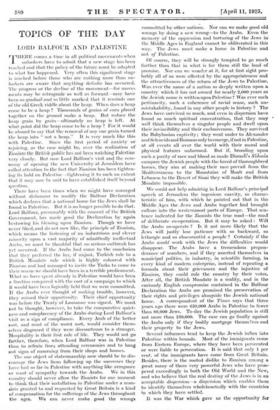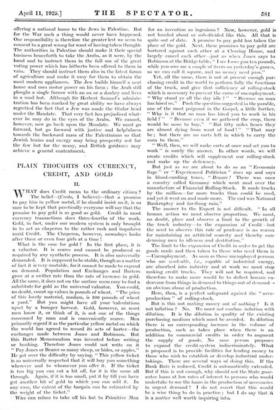TOPICS OF THE DAY
LORD BALFOUR AND PALESTINE
rrHERE comes a time in all political movements when onlookers have to admit that a new stage has been reached and that the policy of the future must be adapted to what has happened. Very often this significant stage is reached before those who are nothing more than on- lookers are aware that anything definite has occurred. The progress or the decline of the movement—for move-. ments may be retrograde as well as forward—may have been so gradual and so little marked that it reminds one of the old Greek riddle about the heap. When does a heap cease to be a heap ? Thousands of grains of corn placed together on the ground make a heap. But reduce the heap grain by grain--ultimately no heap is left. At what point did the heap cease to be a heap ? For it would be absurd to say that the removal of any one grain turned the heap into " not a heap." It is very much like this with Palestine. Since the first period of anxiety or rejoicing, as the case might be, over the realization of Zionism the British public has not been watching Palestine very closely. But now Lord Balfour's visit and the cere- mony of opening the new University at Jerusalem have called attention to the fact that Zionism has been tighten- ing its hold on Palestine—tightening it to such an extent that it may now be said to have established itself beyond question.
There have been times when we might have managed without dishonour to modify the Balfour Declaration which declares that a national home for the Jews shall be found in Palestine. But it is no longer possible to do that. Lord Balfour, presumably with the consent of the British Government, has made good the Declaration by again bestowing his blessing upon Zionism. Though we have never liked, and do not now like, the principle of Zionism, which means the fastening of an industrious and clever minority upon a vast majority of admittedly ineffectual Arabs, we must be thankful that no serious outbreak has vet occurred. If the Arabs had come to the conclusion that they preferred the lax, if unjust, Turkish rule to a British Mandate rule which is highly coloured with Zionism and had managed to incite the Turks to come to their rescue we should have been in a terrible predicament. What we have spent already in Palestine would have been a fraction compared with the cost of a campaign to which It would have been logically held that we were committed. If the Arabs ever thought of making trouble, however, they missed their opportunity. Their chief opportunity was before the Treaty of Lausanne was signed-. We must not be thought, however, to take the comparative quiet- ness and complacency of the Arabs during Lord Balfour's visit as a sign of compliance. Every Arab of the better sort, and most of the worst sort, would consider them- selves disgraced if they were discourteous to a stranger. Hospitality is their first rule of life.. They would not go farther, therefore, when Lord Balfour was in Palestine than to refrain frora attending ceremonies and to hang out signs of mourning from their shops and houses.
The one object of statesmanship now should be to dis- courage the Jews from following up the successes they have had so far in Palestine with anything like arrogance or want of sympathy towards the Arabs. We in this country should never allow the Zionists for one moment to think that their installation in Palestine under a man- date granted to and requested by Great Britain is a kind c)f compensation for the sufferings of the Jews throughout the ages. We can never make good the wrongs committed by other nations. Nor can we make good old wrongs by doing a new wrong—to the Arabs. Even the memory of the oppression and torturing of the Jews in the Middle Ages in England cannot be obliterated in this way. The Jews must make a home in Palestine and not of Palestine.
Of course, they will be strongly tempted to go much further than that in what is for them still the land of promise. Nor can we wonder at it, for at first sight pro- bably all of us were affected by the appropriateness- and the attractiveness of the return of the Jews to Palestine. Was ever the name of a nation so deeply written upon a country which it has not owned for nearly 2,000 years as the Jewish name is written upon Palestine ? Was ever such pertinacity, such a coherence of racial sense, such un- mistakability, found in any other people in history ? The Jews have survived so much, and even in dispersion have found so much spiritual concentration, that they may • well think themselves a singular people and dwell upon their invincibility and their exclusiveness. They survived the Babylonian captivity; they went under to Alexander and Seleucids and Romans only to emerge, if not in Palestine, at all events all over the world with their moral and physical features unharmed. But if, brooding upon such a purity of race and blood as made Disraeli's Sidonia compare the Jewish people with the breed of thoroughbred horses, they aim at making their race prevail from the Mediterranean to the Mountains of Moab and from Lebanon to the Desert of Sinai they will make the British Mandate impossible.
We could not help admiring in Lord Balfour's principal speech at Jerusalem the ingenious suavity, so charac- teristic of him, with which he pointed out that in the Middle Ages the Jews and .Arabs together had brought culture into the westernmost parts of Europe. That sen- tence indicated for the Zionists the true road—the road of deliberate co-operation. But it may be asked : Will the Arabs co-operate ? Is it not more likely that the Jews will justly lose patience with so backward, so . lethargic and so obscurantist a people ? Certainly if the Arabs would work with the Jews the difficulties would disappear. The Arabs have a tremendous prepon- derance of numbers, and if they asserted themselves in municipal politics, in industry, in scientific farming, in every kind of modern enterprise, instead of repeating a formula about their grievances and the injustice of Zionism, they could rule the country by their votes. After all, the British Mandate is a reality, and in the curiously English compromise contained in the Balfour Declaration the Arabs are promised the preservation of their rights and privileges alongside the Jewish national home. A correspondent of the Times says that three years ago there were 650,000 Arabs in Palestine to fewer than 30,000 Jews. To-day the Jewish population is still not more than 130,000. The case can go finally against the Arabs only if they bodily mortgage themselves and their property to the Jews.
Several influences tend to keep the Jewish influx into Palestine within bounds. Most of the immigrants come from Eastern Europe, where they have been persecuted or were liable to persecution. It is said that only 1 per cent. of the immigrants have come from Great Britain. Besides, there is the rooted dislike to Zionism among. a great many of those very powerful Jews who have pros7- pered exceedingly in both the Old World and the New, and who believe that the real destiny of the Jews is in an acceptable dispersion—a dispersion which enables them to identify themselves wholeheartedly with the countries in which they have settled.
It was the War which gave us the opportunity for offering a national home to the Jews in Palestine. But for the War such a thing would never have happened. Our responsibility is therefore the greater lest we seem to consent to a great wrong for want of having taken thought. -The authorities in Palestine should make it their special business henceforth to take the Arabs, as it were, by the hand and to instruct them in the full use of the great voting power which has hitherto been offered to them in vain. They should instruct them also in the latest forms of agriculture and make it easy for them to obtain the most modern appliances. The Jew builds himself a neat house and uses motor power on his farm ; the Arab still ploughs a single furrow with an ox or a donkey and lives in a mud hut. Although Sir Herbert Samuel's adminis- tration has been Marked by great ability we have always regretted the fact that a Jew was made the titular head under the Mandate. That very fact has prejudiced what- ever he may do in the eyes of the Arabs. We cannot, however, now go back upon the Mandate. We must go forward, but go forward with justice and helpfulness towards the backward mass of the Palestinians so that Jewish brains and energy may bring prosperity not for the few but for the many, and British guidance may achieve a general contentment.











































 Previous page
Previous page